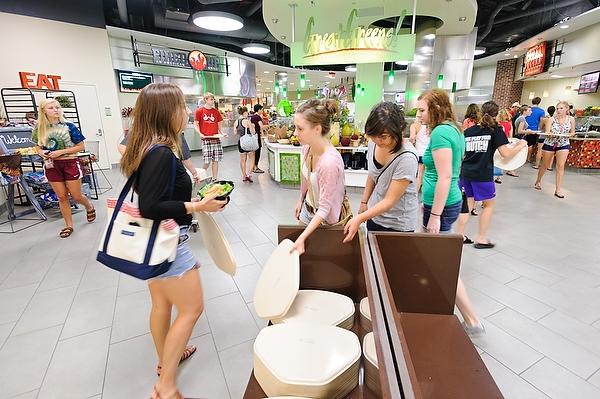It has been more than two months of living the university life, and I’ve met people from nearly every major, race, state and socioeconomic background possible, which is why diversifying a campus should be high on every university’s priority list — you can learn so much.
It also opens one’s mind to the different ways in which people grew up and forces people to abandon their own idea of a “normal” lifestyle, recognizing that everyone was raised in distinct and unique settings. Unfortunately, one thing I have noticed is that some of these lifestyles are extremely wasteful.
In the wake of rising global temperatures, I want to bring attention to the exceedingly wasteful university lifestyle many students partake in and explore ways to reduce further damage to our planet.
One appalling and common norm I have noticed is letting the water run while brushing one’s teeth. Every time I walk into the dorm bathrooms, there is a someone busy wiping off makeup or brushing their teeth with the faucet on blast, causing fresh, clean water to run down the drain. Fact: you use about 5 gallons of water if you leave the water running while brushing your teeth for two minutes.
All it takes is a little common sense and care to know that letting clean water go to waste is easily preventable and unnecessary. How to fix it? A change of mind and habit. Make it a game to see how fast you can turn off the faucet. Reflect on the perils of children in Africa and their parched environment, then be compelled to tweak your privileged American lifestyle to become more Earth and globe-friendly. It’s not hard and it won’t decrease quality of your life. Of all the water in the world, only one percent of water is clean and accessible enough to drink.
Another wasteful daily occurrence is the use of disposable coffee cups. Caffeination is a college phenomenon and many of us visit our favorite cafe regularly in the morning or between classes to keep our energy levels sharp. While carrying reusable water bottles has become a norm, reusable coffee containers have yet to become a staple in every student’s backpack. Research says about 53,000 homes could be powered every year by energy used to make and dispose of these paper cups.
Clearly there are better uses for the resources directed toward coffee cup production than making a cup that’s used once and tossed within a two hour span of time. Cafes around the University of Wisconsin campus should more readily provide incentives for bringing your own mug, a move that would reduce landfill waste.
It is hard to create change and be a compelling voice of reason. I could simply tell others that they are being wasteful, but blaming their lifestyle could backfire and put an unwanted label on environmentally-conscious people. It is all about strategic communication, and therefore, I turn to writing to get across thoughts and talk about issues without offending the audience. On a final note, let’s try to reduce our consumption and works toward becoming a greener campus.
Lisa Heverly (heverly@wisc.edu) is a freshman majoring in international business.


